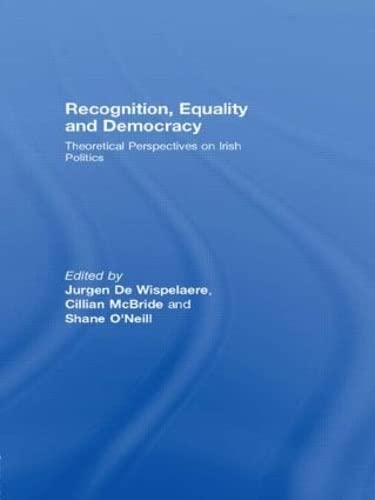
Title

Recognition, Equality and Democracy: Theoretical Perspectives on Irish Politics,Used
Delivery time: 8-12 business days (International)
This volume brings together a range of theoretical responses to issues in Irish politics. Its organising ideas: recognition, equality, and democracy set the terms of political debate within both jurisdictions. For some, there are significant tensions between the grammar of recognition, concerned with esteem, respect and the symbolic aspects of social life, and the logic of equality, which is primarily concerned with the distribution of material resources and formal opportunities, while for others, tensions are produced rather by certain interpretations of these ideas while alternative readings may, by contrast, serve as the basis for a systematic account of social and political inequality. The essays in this collection will explore these interconnections with reference to the politics of Northern Ireland and the Republic. The Republic has gone through a period in which its constitution was the focus for a liberal politics aimed at securing personal autonomy, while Northern Irelands political landscape has been shaped by the problem of securing political autonomy and democratic legitimacy. While the papers address key questions facing each particular polity, the issues themselves have resonances for politics on each side of the border.
By changing our most important processes and
products, we have already made a big leap forward. This ranges from the
increased use of more sustainable fibers to the use of more
environmentally friendly printing processes to the development of
efficient waste management in our value chain.
⚠️ WARNING (California Proposition 65):
This product may contain chemicals known to the State of California to cause cancer, birth defects, or other reproductive harm.
For more information, please visit www.P65Warnings.ca.gov.
Shipping & Returns
Shipping
We ship your order within 2–3 business days for USA deliveries and 5–8 business days for international shipments. Once your package has been dispatched from our warehouse, you'll receive an email confirmation with a tracking number, allowing you to track the status of your delivery.
Returns
To facilitate a smooth return process, a Return Authorization (RA) Number is required for all returns. Returns without a valid RA number will be declined and may incur additional fees. You can request an RA number within 15 days of the original delivery date. For more details, please refer to our Return & Refund Policy page.
Shipping & Returns
Shipping
We ship your order within 2–3 business days for USA deliveries and 5–8 business days for international shipments. Once your package has been dispatched from our warehouse, you'll receive an email confirmation with a tracking number, allowing you to track the status of your delivery.
Returns
To facilitate a smooth return process, a Return Authorization (RA) Number is required for all returns. Returns without a valid RA number will be declined and may incur additional fees. You can request an RA number within 15 days of the original delivery date. For more details, please refer to our Return & Refund Policy page.
Warranty
We provide a 2-year limited warranty, from the date of purchase for all our products.
If you believe you have received a defective product, or are experiencing any problems with your product, please contact us.
This warranty strictly does not cover damages that arose from negligence, misuse, wear and tear, or not in accordance with product instructions (dropping the product, etc.).
Warranty
We provide a 2-year limited warranty, from the date of purchase for all our products.
If you believe you have received a defective product, or are experiencing any problems with your product, please contact us.
This warranty strictly does not cover damages that arose from negligence, misuse, wear and tear, or not in accordance with product instructions (dropping the product, etc.).
Secure Payment
Your payment information is processed securely. We do not store credit card details nor have access to your credit card information.
We accept payments with :
Visa, MasterCard, American Express, Paypal, Shopify Payments, Shop Pay and more.
Secure Payment
Your payment information is processed securely. We do not store credit card details nor have access to your credit card information.
We accept payments with :
Visa, MasterCard, American Express, Paypal, Shopify Payments, Shop Pay and more.
Related Products
You may also like
Frequently Asked Questions
- Q: What is the main focus of 'Recognition, Equality and Democracy: Theoretical Perspectives on Irish Politics'? A: The book explores theoretical responses to key issues in Irish politics, emphasizing the concepts of recognition, equality, and democracy in political debates across Northern Ireland and the Republic of Ireland.
- Q: Who is the author of this book? A: The author of the book is Jurgen De Wispelaere.
- Q: What type of binding does this book have? A: This book is bound in hardcover.
- Q: How many pages are in 'Recognition, Equality and Democracy'? A: The book contains 228 pages.
- Q: When was this book published? A: The book was published on April 25, 2008.
- Q: Is there any specific edition of this book? A: Yes, this is the first edition of the book.
- Q: What topics does the book address regarding Northern Ireland and the Republic of Ireland? A: The essays in the book discuss the political issues of recognition, equality, and democratic legitimacy, highlighting the different political landscapes and challenges of both regions.
- Q: Are there any notable themes discussed in the essays of this book? A: The book discusses significant themes such as the tension between recognition and equality, and how these concepts influence social and political inequality.
- Q: Does the book provide insights into the constitutional politics of the Republic of Ireland? A: Yes, the book examines how the Republic's constitution has focused on liberal politics aimed at securing personal autonomy.
- Q: What are the key questions addressed in this collection of essays? A: The essays tackle key questions related to political autonomy, democratic legitimacy, and the interconnections between recognition and equality in the context of Irish politics.
